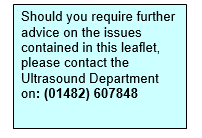- Reference Number: HEY-160/2023
- Departments: Radiology
- Last Updated: 1 January 2023
Introduction
This leaflet has been produced to give you general information about your procedure. Most of your questions should have been answered by this leaflet. It is not intended to replace the discussion between you and your sonographer or doctor. If after reading it you have any concerns or require further explanation, please discuss this with a member of the health care team who has been caring for you.
What is HyCoSy?
HyCoSy stands for Hysterosalpingo Contrast Sonography
It is an investigation of the fallopian tubes. It is not possible to see these tubes with normal x-rays or ultrasound. This test involves the use of a dye [contrast agent] specially designed for use with this type of test. The dye is safe and does not affect future fertility or have any affect on the tubes; it is used so that we can see the tubes much better on the ultrasound scan.
The HyCoSy test is performed by a sonographer with specialist skills in performing this type of procedure. A sonographer is a registered radiographer who has undertaken additional training and qualifications in performing and making diagnoses from ultrasound examinations.
Why do I need a HyCoSy?
The fallopian tubes carry the egg from the ovaries to the uterus. If the tubes are damaged or blocked it may be difficult to become pregnant. You will have been sent for this test if you are having difficulty getting pregnant. Your doctor will want information about your fallopian tubes and whether they may be blocked or damaged. This test can help give the doctor this information and help to plan any future care you may need.
Can there be any complications or risks?
There is a small chance that you may acquire a uterine infection after this procedure – the infection risk due to the procedure is very small. Nationally it is approximately 1 in 100 cases.
If, in the week following your HyCoSy you experience any of the following:
- a high temperature
- aching limbs
- or an offensive smelling vaginal discharge
You must inform your GP as soon as possible.
Tell the GP the examination you have had (a Hystero Contrast Sonography) and your GP will prescribe appropriate antibiotic treatment. Vaginal swabs do not need to be taken. It is important that antibiotic treatment should begin as soon as possible as uterine infections have the potential to block the fallopian tubes.
In order to maintain our records please inform us if you do acquire a uterine infection on (01482) 607848.
If you have any concerns regarding pain or bleeding which is not settling phone your consultant’s secretary for advice.
How do I prepare for a HyCoSy?
This scan is performed transvaginally (an internal scan). No special preparation is required. You will be asked to empty your bladder prior to the examination.
Whilst this test is unlikely to be painful however some ladies experience ‘period type’ pains during and shortly after the test. You are therefore advised to take an anti-inflammatory pain relief such as Ibuprofen or Nurofen half an hour before the examination. If you are unable to take anti-inflammatory medications then Paracetamol may be taken instead.
Pain relief tablets are not provided by the Ultrasound Department.
You should ideally be accompanied home (but not on public transport) in case you have any pain or discomfort after the test. You may have one other person attend the scan with you should you need support.
Booking your appointment
You will be asked to contact the Ultrasound Department on the first day of your menstrual cycle. We will then try and make an appointment for you to have the scan around 7 – 14 days from the start of your period.
The appointment is made at a time when you will have finished menstruating, but before the 14th day of your cycle, which is the average time in a women’s cycle that ovulation occurs.
It is important to do this test before the 14th day. If the HyCoSy scan is carried out after 14 days into your cycle and you have conceived that month, the scan procedure would ‘flush’ the embryo out of the uterus.
If it is not possible to book you a scan that month, due to a lack of available appointment times, then we will try to offer you a scan date during your next monthly cycle.
Please inform the Ultrasound department if you have had an allergic reaction in the past to the dye used (ExEm foam) or any other ultrasound contrast agents.
ou have had an allergic reaction in the past to the dye used (ExEm foam) or any other ultrasound contrast agents.
What will happen?
This test is performed in the ultrasound department on the 2nd floor of the Hospital on the Hull Royal Infirmary site. You need to make your way to the X-Ray reception where a receptionist will greet you and book you into the department.
The examination will take approximately half an hour. This does not include waiting time prior to your appointment. The department endeavors to run to appointment time. However, this is a department that also deals with emergencies and occasionally appointments may be delayed due this.
A member of the ultrasound team will call you in to the scan room. The sonographer will discuss the procedure with you and gain your verbal consent to continue. Prior to the test commencing you will be asked to empty your bladder and will then be shown into the examination room. You will be made comfortable on the examination couch and a transvaginal ultrasound will be carried out. This is a routine procedure and should not hurt.
A speculum is then placed into the vagina [like a cervical smear examination] and a catheter [tube] is inserted into the uterus. Dye is then injected down the catheter and if the fallopian tubes are open, the dye will be seen on the ultrasound scan within the tubes. Not seeing dye in the tubes does not always mean the tubes are blocked but this information is useful for your doctor to help in plan your care and future treatment.
Sometimes, during the scan, it may be evident that you have already ovulated. If this has happened, we will terminate the procedure. Whilst we understand that this is very frustrating for you, your safety is of the upmost importance to us. Performing this test when you have already ovulated could put you at risk of an ectopic pregnancy. If this happens, we will re-arrange the procedure.
What happens afterwards?
The sonographer performing the examination will verbally give you the results immediately after the test. A written report will be sent to your specialist doctor who referred you for this test. You will be able to discuss the results at your next out patient appointment
Providing you do not have any post-procedures complications, which are extremely rare, you will then be able to leave the department immediately following completion of the test.
General Information
Please read the information leaflet. Most of your questions should have been answered by this leaflet/booklet, but remember that this is only a starting point for discussion with your sonographer. Share the information it contains with your partner and family (if you wish) so that they can be of help and support. There may be information they need to know, especially if they are taking care of you following this examination.
For the HyCoSy test you will be given both verbal and written information and after having time to ask questions, you will be asked to give verbal consent for the procedure and you should be satisfied that you have received enough information before going ahead.
This leaflet was produced by the ultrasound Department, Hull and East Yorkshire Hospitals NHS Trust and will be reviewed in January 2025.
General Advice and Consent
Most of your questions should have been answered by this leaflet, but remember that this is only a starting point for discussion with the healthcare team.
Consent to treatment
Before any doctor, nurse or therapist examines or treats you, they must seek your consent or permission. In order to make a decision, you need to have information from health professionals about the treatment or investigation which is being offered to you. You should always ask them more questions if you do not understand or if you want more information.
The information you receive should be about your condition, the alternatives available to you, and whether it carries risks as well as the benefits. What is important is that your consent is genuine or valid. That means:
- you must be able to give your consent
- you must be given enough information to enable you to make a decision
- you must be acting under your own free will and not under the strong influence of another person
Information about you
We collect and use your information to provide you with care and treatment. As part of your care, information about you will be shared between members of a healthcare team, some of whom you may not meet. Your information may also be used to help train staff, to check the quality of our care, to manage and plan the health service, and to help with research. Wherever possible we use anonymous data.
We may pass on relevant information to other health organisations that provide you with care. All information is treated as strictly confidential and is not given to anyone who does not need it. If you have any concerns please ask your doctor, or the person caring for you.
Under the General Data Protection Regulation and the Data Protection Act 2018 we are responsible for maintaining the confidentiality of any information we hold about you. For further information visit the following page: Confidential Information about You.
If you or your carer needs information about your health and wellbeing and about your care and treatment in a different format, such as large print, braille or audio, due to disability, impairment or sensory loss, please advise a member of staff and this can be arranged.


